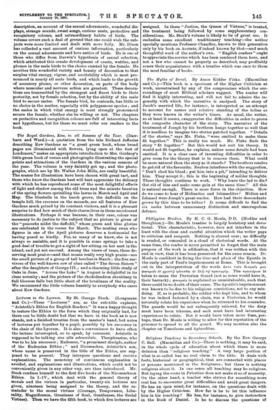Philippian Studies. By H. C. G. Moule, D D. (Hodder
and Stoughton.)—Dr. Moule's treatise is largely hostatory and devo- tional. This characteristic, however, does not interfere in the least with the close and careful attention which the writer pays to criticism and exegesis. Nothing is slurred over ; no difficulty is evaded, or concealed in a cloud of rhetorical words. At the same time, the reader is never permitted to forget that the main purpose of the work is edification, that it was written with this end in view, that it has been preserved for the same reason. Dr. Moule is confident in fixing the time and place of the Epistle in the early part of Paul's imprisonment at Rome. This is brought out in the interpretation of the words 470-TE robs. SscrihoL'is am, ipavepoos ev xplo-rig 74vccrOat hi 3AL; rep' w-pacropfce. The rpaLrdlnov is taken to mean the Prwtorian Guard (not as some would have it, their barrack) ; cpasEfen4 is explained as unmistakeable, such that there could be no doubt of their cause. The A postle's imprisonment was known to be due to his religious convictions, not to any mis- doing. If, as is probable, the soldier who kept him, and to whom he was indeed fastened by a chain, was a Prxtorian, he would naturally relate his experience when he returned to his comrades. The guards would be not unfrequently relieved, for the duty must have been irksome, and each must have had interesting experiences to relate. But it would have taken more time, per- haps, than Dr. Moule is willing to allow for this reputation of the prisoner to spread to all the guard. We may mention also the chapter on Timotheus and Aphroditus.


















































 Previous page
Previous page